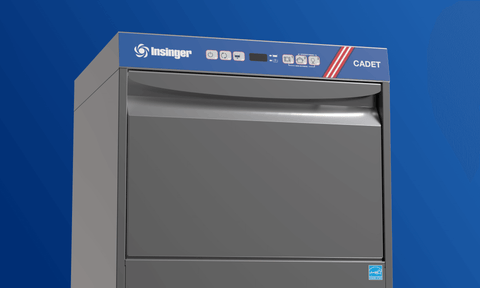Join us for a conversation with team Insinger, a proud partner of Standart Issue 28.
What have been the most significant technological advances made in warewashing since Insinger’s foundation in 1893? We’re curious about the history of innovation.
The three greatest advances in warewashing innovation have been the change in materials (i.e. cast iron and brass to stainless steel and plastic resins), IoT controls, and ventless technology (systems that remove steam from the cavity of a dishwasher and eliminate the need for a dedicated condensate ventilation system).
'Our mission is to provide simple yet effective solutions to any job that calls for it, and to develop new warewashing innovations to push the industry forward.'
Your CADET series offers three unique washing cycles. What are they and how do they differ?
The Cadet utilizes a variable pressure wash pump motor. That enables the product to apply low and high water pressure during the washing process as necessary. During the glass washing mode, low water pressure is applied with an extended final rinse to prevent stemware from breaking and to ensure sparkling results. In contrast, the crockery washing mode relies on high pressure to effectively remove heavy food soil from the surface of the ware. Thus, the Cadet is three machines in one: a dishwasher, a glass washer, and a pot and pan washer—saving time, money, and energy.
Your machines are highly rated for energy efficiency, and yet we still see many coffee shops washing dishes by hand! Do you have any figures that might suggest the extent of the water saving when using an Insinger dishwasher vs. washing by hand?
Professional dishwashers offer the most efficient means to clean soiled ware in a coffee shop. The reason is simple: a dishwashing machine eliminates all of the variables—everything is controlled—from energy consumption to time to temperature.
'Whether you’re a budding barista or a polished café owner, nothing is more important than the quality of your coffee and the safety of your patrons.'
Consider all of the variables when handwashing ware: Is the faucet off or constantly running water? Is the rinsing water at temperature? Are the washing chemicals at the proper pH levels? How often is the wash basin emptied and refilled with fresh water? Did the barista properly sanitize each piece of soiled ware? How much time are staff members spending on dishwashing (non-revenue generating activity) instead of serving guests (revenue generating activity)?

A professional dishwashing machine eliminates all of that by providing constant, consistent control. Insinger estimates that the average Cadet under-counter dishwasher saves nearly 100 litres of fresh water consumption each day compared to hand washing—and most importantly, the Cadet product meets and exceeds the U.S. Department of Energy’s new Energy Star 3.0 rating for idle and active energy consumption for professional dishwashing appliances—something we take great pride in.
This interview was published in proud partnership with Insinger.



